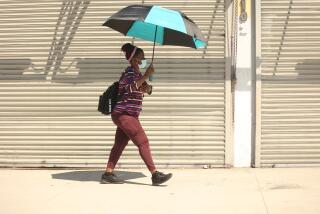Dog (and Cat) Days of Summer : Pets are susceptible to hot-weather ailments, including heatstroke, snakebites and skin problems.
Itâs hot outside. Hotter than Hades. Hot enough to fry an egg on the sidewalk. Broiling, blazing, oppressively hot.
So you sip iced tea by the pool or cruise in your air-conditioned car to your refrigerated office.
But do you know where your pets are? If theyâre in a sunny back yard, they are probably doggone miserable.
âDogs and cats donât have any greater ability to tolerate 110-degree heat than we do,â said veterinarian Gayle A. Robison, owner of Catâs Meow Clinic in Woodland Hills. âHot weather is uncomfortable and dangerous for everyone.â
During the dog days of summer, your pets are susceptible to a number of seasonal ailments, from heatstroke to snakebites. But pet owners can help them stay cool and comfortable, even in the hottest weather.
Heatstroke, which damages the animalâs brain and internal organs and interferes with blood clotting, is one of the greatest summer dangers for pets. It is often fatal.
However, it is easily avoided by providing animals with ample shade, plenty of fresh water and freely circulating air.
Animals locked inside a car--even for just a few minutes--are at extreme risk of heatstroke. âThe inside of a car gets hot enough to kill,â Robison said, âand it doesnât take long.â
Itâs also not a good idea to keep your pet in a poorly ventilated, stifling garage all day, she said.
According to Granada Hills veterinarian James Miller of Chatoak pet hospital, very young, old and obese animals can get heatstroke if they are left outside on hot days. âI see at least one case of heatstroke every month during summer,â he said.
Dogs are more likely than cats to develop heatstroke, according to Robison. âDogs donât have as much common sense as cats do,â she said. âCats find the coolest place in the house or yard and they sit quietly. Dogs run around and they just cook.
âBut young cats get in trouble. I know of a cat that worked himself into a frenzy chasing grasshoppers for hours on a hot afternoon.â
Short-nosed canines, such as bulldogs, Lhasa apsos, Pekingese and boxers are especially at risk of heatstroke because their respiratory systems are not as efficient as long-snouted breeds.
Symptoms of heatstroke include excessive panting, elevated temperature, warm foot pads, vomiting and diarrhea. A veterinarian should be called immediately if an animal displays those symptoms.
Animals are more likely to have skin problems during summer months. Foxtails and grass seeds can lodge between an animalâs toes or penetrate the skin and cause abscesses. The same pollen that makes a person sneeze irritates a petâs skin. Dogs can develop painful blisters on their foot pads from running on hot pavement.
âDogs bite, chew and lick at âhot spotsâ on the skin, causing an infection,â Miller said. âItâs like a child picking at a mosquito bite.â
Many skin problems can be prevented by staying off fields with dry vegetation. Animals, especially those with thick coats, should be regularly groomed with a fine-toothed comb.
Dogs with long hair donât necessarily need a haircut, according to Robison. âA dogâs heavy coat actually provides insulation from the heat,â she said. âItâs not a good idea to automatically shave our dogs for the summer, unless a veterinarian recommends it.â
But Miller added that if you donât routinely comb your dogâs hair, a crew cut may be in order.
Bites from snakes, spiders and insects also are more likely to occur during summer months.
According to Miller, snakes are most dangerous in early summer when they first come out of hibernation. Smaller snakes are especially toxic.
âAnimals donât die from the bite itself, but from complications, especially allergic reactions,â Miller said. âIf treated early, the survival rate is 80% to 90%.â
Stings and insect bites cause swelling. Dogs that catch bees in their mouths will probably get stung for their efforts, and their faces will swell. In some cases, a bite will become infected.
Bites from some spiders, such as the black widow and the brown recluse, are venomous, but stings and spider bites are rarely fatal and usually respond well to treatment, veterinarians say.
Hot Tips for Cool Pets
* Never lock your pet in a car.
* Provide pets with shade and plenty of fresh water--not pool water.
* Groom your pets regularly.
* Be careful with the pool. Puppies can fall in, flounder around and drown.
* Donât automatically bring your dog along on summer outings. Your pet may be more comfortable at home.
* Donât let your pets overexert themselves on hot days.
* If you plan to take your dog on a trip, stop at the vet first. Vaccinations and preventive medications are available for Lyme disease and heartworm. Both ailments are caused by parasites rare in Los Angeles but widespread through much of the country.
More to Read
Sign up for Essential California
The most important California stories and recommendations in your inbox every morning.
You may occasionally receive promotional content from the Los Angeles Times.










